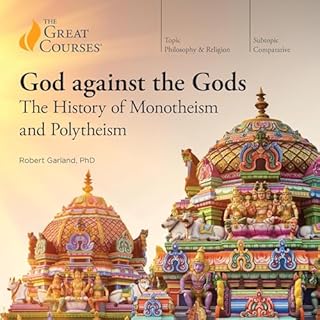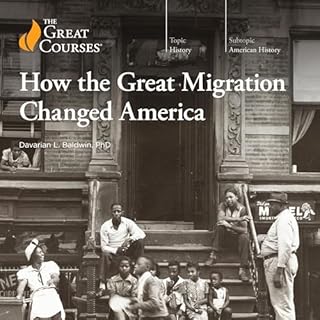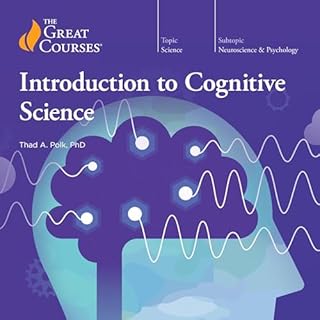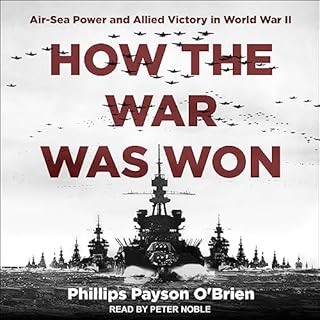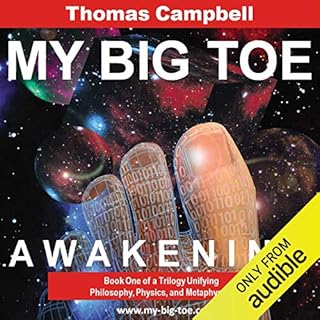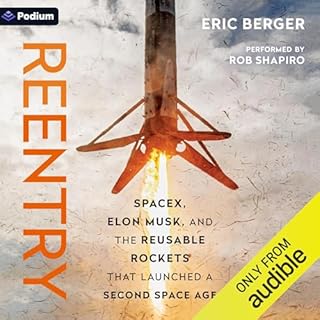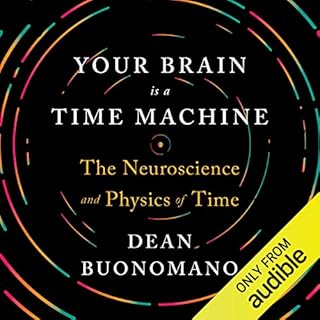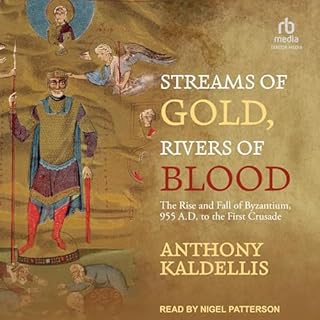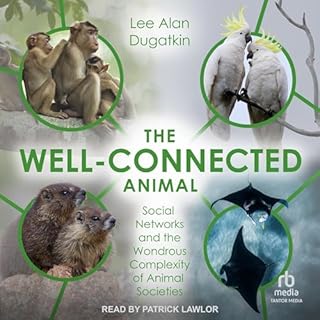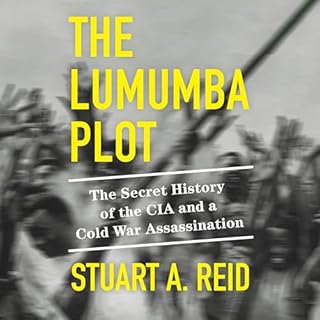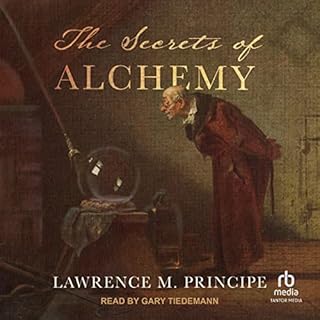
How Railways Transformed the World
Failed to add items
Add to Cart failed.
Add to Wish List failed.
Remove from wishlist failed.
Adding to library failed
Follow podcast failed
Unfollow podcast failed
 Prime members: New to Audible?
Prime members: New to Audible?Get 2 free audiobooks during trial.
Buy for $33.90
No default payment method selected.
We are sorry. We are not allowed to sell this product with the selected payment method
-
Narrated by:
-
Patrick N. Allitt
About this listen
Railways are one of the most important inventions in modern history. From the 1825 opening of the Stockton and Darlington Railway in England, trains revolutionized both travel and trade and radically changed the way we experience the world.
In the 24 richly illustrated lectures of How Railways Transformed the World, you’ll experience the amazing world and impact of railways, from the early 19th century to today’s futuristic trains, including extensive material on the pleasure and appeal of rail travel today. Professor Patrick N. Allitt of Emory University takes you through key developments of railways, such as:
· The Beginnings: Steam and Iron. Encounter the inventers who first mounted steam engines on wheels; track evolving rail technology and the engineering marvels that drove the railway revolution.
· A Radically Changing World. Observe how railways galvanized the Industrial Revolution, hugely increased mobility, made nationwide commerce possible, sparked organized labor, and pioneered tourism.
· Railways in Politics, Empire, and War. Note 19th-century politicians’ strategic promotion of railways; the use of railroads in European colonial empires; and delve into the integral wartime use of railways.
· Great Train Journeys of the World. Learn where you can enjoy the best of rail travel today: Visualize the dramatic terrain on South Africa’s Rovos Rail; glimpse superlative trains and scenery on Switzerland’s Jungfrau and Bernina railways, India’s Darjeeling railway, Colorado’s Cumbres & Toltec Scenic Railway, and many others.
· Rail Travel in Culture and Art. Examine the use of railway settings in great novels; in art; in great films; and explore some of the most magnificent architecture of the modern world: great train stations.
· Railways and the Future. Learn about advancing rail technology, today’s high-speed trains, and cutting-edge rail systems which envision trains traveling at up to 700 mph.
In How Railways Transformed the World, you’ll enjoy the fascinating history and lore of an invention that forever changed human life.
PLEASE NOTE: When you purchase this title, the accompanying PDF will be available in your Audible Library along with the audio.
©2024 The Great Courses (P)2024 The Teaching Company, LLCListeners also enjoyed...
-
What America’s Founders Learned from Antiquity
- By: Caroline Winterer, The Great Courses
- Narrated by: Caroline Winterer
- Length: 12 hrs and 55 mins
- Original Recording
-
Overall4.5 out of 5 stars 6
-
Performance5 out of 5 stars 3
-
Story5 out of 5 stars 3
Many Americans know that our nation’s founders drew inspiration from the political systems of ancient Rome and Greece. But what exactly were these influences? And did they shape the United States in far-reaching ways? In these 24 compelling lectures, Professor Winterer takes you on a journey into the thought and actions of the American revolutionaries, showing how classical antiquity shaped every aspect of the revolutionary and founding era.
By: Caroline Winterer, and others
-
Communism in Decline: From Sputnik to Gorbachev
- By: Vejas Gabriel Liulevicius, The Great Courses
- Narrated by: Vejas Gabriel Liulevicius
- Length: 6 hrs and 37 mins
- Original Recording
-
Overall5 out of 5 stars 5
-
Performance5 out of 5 stars 5
-
Story5 out of 5 stars 5
In Communism in Decline: From Sputnik to Gorbachev, Professor Vejas Gabriel Liulevicius reveals the internal and external forces that ripped apart the grand communist experiment. What were the mistakes made by the Soviet leaders who believed too deeply in their own propaganda? And why were they not able to see the many ironies in their own poor decisions? In 12 fascinating lectures, you will learn how the Soviet Union went from winning the space race against the United States in 1957 to Gorbachev’s resignation and the dissolution of the great experiment in 1991.
By: Vejas Gabriel Liulevicius, and others
-
God Against the Gods
- The History of Monotheism and Polytheism
- By: Robert Garland, The Great Courses
- Narrated by: Robert Garland
- Length: 6 hrs and 50 mins
- Original Recording
-
Overall4.5 out of 5 stars 7
-
Performance5 out of 5 stars 5
-
Story5 out of 5 stars 5
Religion is foundational to what it means to be human. Our quest for meaning is as ancient as our very existence, stretching back to a time when Neanderthal burials and Paleolithic figurines suggest our ancestors recognized a power that transcended visible reality. From ancient civilizations to the 21st century, belief in a higher power seems to be a universal human instinct. These 12 thought-provoking lectures introduce you to the world of comparative religion, giving you insights into a variety of religious expressions and human cultures.
By: Robert Garland, and others
-
Early Modern Philosophy: Descartes and the Rationalists
- By: James D. Reid, The Great Courses
- Narrated by: James D. Reid
- Length: 6 hrs and 13 mins
- Original Recording
-
Overall0 out of 5 stars 0
-
Performance0 out of 5 stars 0
-
Story0 out of 5 stars 0
From the 17th to 18th centuries, bold thinkers cast off the authority of ancient traditions and embraced reason as the primary tool for understanding the world. These rationalists, or early modern philosophers, included René Descartes, Baruch Spinoza, and Gottfried Wilhelm Leibniz—visionaries whose answers to profound questions remain relevant today. Early Modern Philosophy: Descartes and the Rationalists covers the key philosophers of this period in 12 fascinating half-hour lectures, presented by award-winning teacher James D. Reid, Professor of Philosophy at Metropolitan State University.
By: James D. Reid, and others
-
How the Great Migration Changed America
- By: Davarian L. Baldwin, The Great Courses
- Narrated by: Davarian L. Baldwin
- Length: 5 hrs and 41 mins
- Original Recording
-
Overall4 out of 5 stars 1
-
Performance4 out of 5 stars 1
-
Story4 out of 5 stars 1
During the Great Migration, Black Americans led a mass exodus out of the South. But not all that glittered in the imagination was gold in the real world across the Mason-Dixon line. They contended with dim economic prospects and sparred with white labor unions. They also struggled to assimilate into established Black communities. Nevertheless, these 6 million Black migrants left an indelible mark on life in the United States. How the Great Migration Changed America explores the causes and consequences of the Great Northward Migration in 12 eye-opening lectures.
By: Davarian L. Baldwin, and others
-
Unsung Heroes of the Ancient World
- By: Gregory S. Aldrete, The Great Courses
- Narrated by: Gregory S. Aldrete
- Length: 13 hrs and 15 mins
- Original Recording
-
Overall5 out of 5 stars 1
-
Performance5 out of 5 stars 1
-
Story5 out of 5 stars 1
The 24 revealing lectures of Unsung Heroes of the Ancient World reconstruct over a dozen biographies from the classical world—most of them little-known, some of them quite unlikely heroes. With Professor Emeritus Gregory Aldrete as your expert guide, you will meet the ambitious travel writers, dedicated engineers, careful cartographers, diligent farmers, woman philosophers, devoted wives, skilled military generals, African rebels, Persian kings, and impressive athletes who stood out among their peers centuries ago.
By: Gregory S. Aldrete, and others
-
What America’s Founders Learned from Antiquity
- By: Caroline Winterer, The Great Courses
- Narrated by: Caroline Winterer
- Length: 12 hrs and 55 mins
- Original Recording
-
Overall4.5 out of 5 stars 6
-
Performance5 out of 5 stars 3
-
Story5 out of 5 stars 3
Many Americans know that our nation’s founders drew inspiration from the political systems of ancient Rome and Greece. But what exactly were these influences? And did they shape the United States in far-reaching ways? In these 24 compelling lectures, Professor Winterer takes you on a journey into the thought and actions of the American revolutionaries, showing how classical antiquity shaped every aspect of the revolutionary and founding era.
By: Caroline Winterer, and others
-
Communism in Decline: From Sputnik to Gorbachev
- By: Vejas Gabriel Liulevicius, The Great Courses
- Narrated by: Vejas Gabriel Liulevicius
- Length: 6 hrs and 37 mins
- Original Recording
-
Overall5 out of 5 stars 5
-
Performance5 out of 5 stars 5
-
Story5 out of 5 stars 5
In Communism in Decline: From Sputnik to Gorbachev, Professor Vejas Gabriel Liulevicius reveals the internal and external forces that ripped apart the grand communist experiment. What were the mistakes made by the Soviet leaders who believed too deeply in their own propaganda? And why were they not able to see the many ironies in their own poor decisions? In 12 fascinating lectures, you will learn how the Soviet Union went from winning the space race against the United States in 1957 to Gorbachev’s resignation and the dissolution of the great experiment in 1991.
By: Vejas Gabriel Liulevicius, and others
-
God Against the Gods
- The History of Monotheism and Polytheism
- By: Robert Garland, The Great Courses
- Narrated by: Robert Garland
- Length: 6 hrs and 50 mins
- Original Recording
-
Overall4.5 out of 5 stars 7
-
Performance5 out of 5 stars 5
-
Story5 out of 5 stars 5
Religion is foundational to what it means to be human. Our quest for meaning is as ancient as our very existence, stretching back to a time when Neanderthal burials and Paleolithic figurines suggest our ancestors recognized a power that transcended visible reality. From ancient civilizations to the 21st century, belief in a higher power seems to be a universal human instinct. These 12 thought-provoking lectures introduce you to the world of comparative religion, giving you insights into a variety of religious expressions and human cultures.
By: Robert Garland, and others
-
Early Modern Philosophy: Descartes and the Rationalists
- By: James D. Reid, The Great Courses
- Narrated by: James D. Reid
- Length: 6 hrs and 13 mins
- Original Recording
-
Overall0 out of 5 stars 0
-
Performance0 out of 5 stars 0
-
Story0 out of 5 stars 0
From the 17th to 18th centuries, bold thinkers cast off the authority of ancient traditions and embraced reason as the primary tool for understanding the world. These rationalists, or early modern philosophers, included René Descartes, Baruch Spinoza, and Gottfried Wilhelm Leibniz—visionaries whose answers to profound questions remain relevant today. Early Modern Philosophy: Descartes and the Rationalists covers the key philosophers of this period in 12 fascinating half-hour lectures, presented by award-winning teacher James D. Reid, Professor of Philosophy at Metropolitan State University.
By: James D. Reid, and others
-
How the Great Migration Changed America
- By: Davarian L. Baldwin, The Great Courses
- Narrated by: Davarian L. Baldwin
- Length: 5 hrs and 41 mins
- Original Recording
-
Overall4 out of 5 stars 1
-
Performance4 out of 5 stars 1
-
Story4 out of 5 stars 1
During the Great Migration, Black Americans led a mass exodus out of the South. But not all that glittered in the imagination was gold in the real world across the Mason-Dixon line. They contended with dim economic prospects and sparred with white labor unions. They also struggled to assimilate into established Black communities. Nevertheless, these 6 million Black migrants left an indelible mark on life in the United States. How the Great Migration Changed America explores the causes and consequences of the Great Northward Migration in 12 eye-opening lectures.
By: Davarian L. Baldwin, and others
-
Unsung Heroes of the Ancient World
- By: Gregory S. Aldrete, The Great Courses
- Narrated by: Gregory S. Aldrete
- Length: 13 hrs and 15 mins
- Original Recording
-
Overall5 out of 5 stars 1
-
Performance5 out of 5 stars 1
-
Story5 out of 5 stars 1
The 24 revealing lectures of Unsung Heroes of the Ancient World reconstruct over a dozen biographies from the classical world—most of them little-known, some of them quite unlikely heroes. With Professor Emeritus Gregory Aldrete as your expert guide, you will meet the ambitious travel writers, dedicated engineers, careful cartographers, diligent farmers, woman philosophers, devoted wives, skilled military generals, African rebels, Persian kings, and impressive athletes who stood out among their peers centuries ago.
By: Gregory S. Aldrete, and others
-
The Evolution of American Federalism
- By: Joseph L. Hoffmann, The Great Courses
- Narrated by: Joseph L. Hoffmann
- Length: 12 hrs and 19 mins
- Original Recording
-
Overall4.5 out of 5 stars 3
-
Performance5 out of 5 stars 1
-
Story5 out of 5 stars 1
The promise of America is that the country is based on an idea, one where everyone is created equal and equally free to chart their own course. From 13 newly independent states ratifying a national constitution to the heated debates in the halls of Congress today, American politics is about negotiation over what our country is—and where we are going.
By: Joseph L. Hoffmann, and others
-
The World of Sugar
- How the Sweet Stuff Transformed Our Politics, Health, and Environment over 2,000 Years
- By: Ulbe Bosma
- Narrated by: Julian Elfer
- Length: 13 hrs and 57 mins
- Unabridged
-
Overall4 out of 5 stars 16
-
Performance4.5 out of 5 stars 13
-
Story4 out of 5 stars 13
For most of history, humans did without refined sugar. Granulated sugar was first produced in India around the sixth century BC, yet for almost 2,500 years afterward sugar remained marginal in the diets of most people. Then, suddenly, it was everywhere. How did sugar find its way into almost all the food we eat, fostering illness and ecological crisis along the way? The World of Sugar begins with the earliest evidence of sugar production.
-
4 out of 5 stars
-
Important work well-told
- By Amazon Customer on 11-05-23
By: Ulbe Bosma
-
Warping Reality: Inside the Psychology of Cults
- By: Wind Goodfriend, The Great Courses
- Narrated by: Wind Goodfriend
- Length: 6 hrs and 11 mins
- Original Recording
-
Overall4.5 out of 5 stars 3
-
Performance4.5 out of 5 stars 2
-
Story4.5 out of 5 stars 2
In the 12 fascinating lectures of Warping Reality: Inside the Psychology of Cults, you will learn about some of the most widely known cults of modern times. But unlike any standard news reporting or documentary about the Peoples Temple, The Manson “Family,” The Branch Davidians, Heaven’s Gate, Children of God, the Unification Church, and NXIVM, your expert, Dr. Wind Goodfriend, will help you explore the psychology of these cults. How could these cult leaders have committed such heinous crimes under the guise of “helping” members in their development?
By: Wind Goodfriend, and others
-
Stories of America’s National Parks
- By: Megan Kate Nelson, The Great Courses
- Narrated by: Megan Kate Nelson
- Length: 5 hrs and 52 mins
- Original Recording
-
Overall4 out of 5 stars 1
-
Performance4 out of 5 stars 1
-
Story4 out of 5 stars 1
Many Americans remember a family road trip to visit one of our 63 national parks. Why did Americans start preserving these sites of natural and historic interest? How were these parks selected, and what steps did conservationists, activists, philanthropists, politicians, and others take to protect millions of acres against the booming developments of an expanding nation? An award-winning writer, researcher, and American Studies scholar, Dr. Megan Kate Nelson tackles these questions as she takes you on a marvelous journey through some of the most beautiful places on Earth.
By: Megan Kate Nelson, and others
-
Introduction to Cognitive Science
- By: Thad A. Polk, The Great Courses
- Narrated by: Thad A. Polk
- Length: 12 hrs and 53 mins
- Original Recording
-
Overall5 out of 5 stars 7
-
Performance5 out of 5 stars 6
-
Story5 out of 5 stars 6
For millennia, philosophers and scientists have been trying to unlock the secrets of the mind with only limited success—until now. Today, with modern technologies including the best in neuroscience, medical imaging, and recent advances in artificial intelligence, we are making more progress than ever before. In Introduction to Cognitive Science, Professor Thad A. Polk takes you on a fascinating tour of the latest discoveries in the relatively new field of cognitive science. In 24 exciting lectures, Professor Polk shares dozens of the most challenging questions in cognitive science today.
-
5 out of 5 stars
-
Great narration as always by Thad Polk
- By PJSSR on 01-07-25
By: Thad A. Polk, and others
-
How the War Was Won
- Air-Sea Power and Allied Victory in World War II
- By: Phillips Payson O'Brien
- Narrated by: Peter Noble
- Length: 22 hrs and 57 mins
- Unabridged
-
Overall4.5 out of 5 stars 38
-
Performance4.5 out of 5 stars 35
-
Story4.5 out of 5 stars 35
World War II is usually seen as a titanic land battle, decided by mass armies, most importantly those on the Eastern Front. Phillips Payson O'Brien shows us the war in a completely different light. In this compelling new history of the Allied path to victory, he argues that in terms of production, technology, and economic power, the war was far more a contest of air and sea than of land supremacy.
-
4 out of 5 stars
-
Excellent history, but repetitive
- By Anna S. on 11-26-23
-
Understanding the World of Financial Markets
- By: Connel Fullenkamp, The Great Courses
- Narrated by: Connel Fullenkamp
- Length: 5 hrs and 5 mins
- Original Recording
-
Overall5 out of 5 stars 3
-
Performance5 out of 5 stars 2
-
Story5 out of 5 stars 2
Whether you’re buying a home, saving for retirement, running a business, or just plain speculating, it’s important to understand financial markets. These are the engines of commerce in today’s world, powering economic activity and steering the flow of capital. Taught by Professor Connel Fullenkamp of Duke University, Understanding the World of Financial Markets is aimed at the ordinary investor and surveys the impressive range of financial markets—from stocks and bonds to futures, options, real estate, private equity, and virtual assets.
By: Connel Fullenkamp, and others
-
The Viking Age: New Perspectives on History and Culture
- By: Jennifer Paxton, The Great Courses
- Narrated by: Jennifer Paxton
- Length: 6 hrs and 37 mins
- Original Recording
-
Overall5 out of 5 stars 2
-
Performance5 out of 5 stars 2
-
Story5 out of 5 stars 2
The Vikings evoke striking images of horned helmets, battle axes, and merciless coastal raids. Remembered for their shocking brutality and impressive naval prowess, these marauding pirates from the North have inspired poetry, fantasy novels, plays, symphonies, and even comic book heroes over the last 12 centuries. But do any of these enduring tropes reflect reality? Who were the Vikings really? What do we know about the period that bears their name? Explore these questions and more in The Viking Age, a 12-lecture course that corrects the record on a transformative period in world history.
-
5 out of 5 stars
-
Prof. Paxton and the Viking’s
- By Kindle Customer on 11-18-24
By: Jennifer Paxton, and others
-
1177 B.C. (Revised and Updated)
- The Year Civilization Collapsed
- By: Eric H. Cline
- Narrated by: Eric H. Cline
- Length: 10 hrs and 47 mins
- Unabridged
-
Overall4.5 out of 5 stars 636
-
Performance4 out of 5 stars 553
-
Story4.5 out of 5 stars 552
This audiobook narrated by acclaimed archaeologist and best-selling author Eric Cline offers a breathtaking account of how the collapse of an ancient civilized world ushered in the first Dark Ages.
-
5 out of 5 stars
-
Look past the one-star reviews: this is an enlightening and engaging read.
- By Alonzo Nightjar on 03-07-22
By: Eric H. Cline
-
10 Great What-Ifs of American History
- By: Adam Jortner, The Great Courses
- Narrated by: Adam Jortner
- Length: 3 hrs and 54 mins
- Original Recording
-
Overall4 out of 5 stars 8
-
Performance4 out of 5 stars 7
-
Story4 out of 5 stars 7
Accompanied by a selection of guests, Professor Jortner takes you through a mind-bending exploration of the history that could have been. Captivating storytellers and imaginative thinkers, these experts show how history is contingent on split-second decisions, near misses, and sheer dumb luck. By reflecting on what didn’t happen, 10 Great What-Ifs of American History gives you new insights on what did happen—and the impact on our world today.
-
2 out of 5 stars
-
Overacting and Multiple Narrators Distracting
- By homedaddy on 05-09-24
By: Adam Jortner, and others
-
Christendom
- The Triumph of a Religion, AD 300-1300
- By: Peter Heather
- Narrated by: Peter Heather
- Length: 23 hrs and 48 mins
- Unabridged
-
Overall4.5 out of 5 stars 29
-
Performance4.5 out of 5 stars 28
-
Story4.5 out of 5 stars 28
In the fourth century AD, a new faith exploded out of Palestine. Overwhelming the paganism of Rome, and converting the Emperor Constantine in the process, it resoundingly defeated a host of other rivals. Almost a thousand years later, all of Europe was controlled by Christian rulers, and the religion, ingrained within culture and society, exercised a monolithic hold over its population. But, as Peter Heather shows in this compelling new history, there was nothing inevitable about Christendom's rise to Europe-wide dominance.
-
3 out of 5 stars
-
Not great.
- By Timothy on 01-06-25
By: Peter Heather
-
London in the Time of Dickens
- By: Lillian Nayder, The Great Courses
- Narrated by: Lillian Nayder
- Length: 6 hrs and 8 mins
- Original Recording
-
Overall4.5 out of 5 stars 10
-
Performance4.5 out of 5 stars 9
-
Story4.5 out of 5 stars 9
In London in the Time of Dickens, you’ll get the unique opportunity to experience the British capital through the eyes of a literary master whose work is inextricably tied to the city and its rich history. Throughout 12 lectures taught by Professor Lillian Nayder of Bates College, you’ll tour the city of London in a time of rapid transformation through the life and work of Charles Dickens, uncovering the history of the metropolis, while also witnessing the everyday experiences of Londoners from all walks of life as Dickens represents them.
-
5 out of 5 stars
-
The book read like an interesting Biography and at the same time it painted what was going on in London at that time !😊
- By miriam wismar on 12-02-23
By: Lillian Nayder, and others
Related to this topic
-
Brain Energy
- A Revolutionary Breakthrough in Understanding Mental Health—and Improving Treatment for Anxiety, Depression, OCD, PTSD, and More
- By: Christopher M. Palmer MD
- Narrated by: Christopher M. Palmer MD
- Length: 12 hrs and 18 mins
- Unabridged
-
Overall4.5 out of 5 stars 1,162
-
Performance4.5 out of 5 stars 1,015
-
Story4.5 out of 5 stars 1,011
We are in the midst of a global mental health crisis, and mental illnesses are on the rise. But what causes mental illness? And why are mental health problems so hard to treat? Drawing on decades of research, Harvard psychiatrist Dr. Chris Palmer outlines a revolutionary new understanding that for the first time unites our existing knowledge about mental illness within a single framework: mental disorders are metabolic disorders of the brain. Brain Energy will transform the field of mental health, and the lives of countless people around the world.
-
1 out of 5 stars
-
Arguing brain health theory to medical profession
- By Maya H Saric on 03-10-23
-
The Selfish Gene
- By: Richard Dawkins
- Narrated by: Richard Dawkins, Lalla Ward
- Length: 16 hrs and 12 mins
- Unabridged
-
Overall4.5 out of 5 stars 8,931
-
Performance4.5 out of 5 stars 7,546
-
Story4.5 out of 5 stars 7,468
Richard Dawkins' brilliant reformulation of the theory of natural selection has the rare distinction of having provoked as much excitement and interest outside the scientific community as within it. His theories have helped change the whole nature of the study of social biology, and have forced thousands to rethink their beliefs about life.
-
5 out of 5 stars
-
Better than print!
- By J. D. May on 07-31-12
By: Richard Dawkins
-
How the Earth Works
- By: Michael E. Wysession, The Great Courses
- Narrated by: Michael E. Wysession
- Length: 24 hrs and 31 mins
- Original Recording
-
Overall4.5 out of 5 stars 1,727
-
Performance4.5 out of 5 stars 1,507
-
Story4.5 out of 5 stars 1,489
How the Earth Works takes you on an astonishing journey through time and space. In 48 lectures, you will look at what went into making our planet - from the big bang, to the formation of the solar system, to the subsequent evolution of Earth.
-
5 out of 5 stars
-
Excellent course
- By Doug B. on 05-23-19
By: Michael E. Wysession, and others
-
Letters from an Astrophysicist
- By: Neil deGrasse Tyson
- Narrated by: Neil deGrasse Tyson, Vikas Adam, Piper Goodeve, and others
- Length: 5 hrs and 35 mins
- Unabridged
-
Overall4.5 out of 5 stars 2,136
-
Performance5 out of 5 stars 1,845
-
Story4.5 out of 5 stars 1,827
Astrophysicist Neil deGrasse Tyson has attracted one of the world’s largest online followings with his fascinating, widely accessible insights into science and our universe. Now, Tyson invites us to go behind the scenes of his public fame by unveiling his candid correspondence with people across the globe who have sought him out in search of answers. In this hand-picked collection of 100 letters, Tyson draws upon cosmic perspectives to address a vast array of questions about science, faith, philosophy, life, and of course, Pluto.
-
4 out of 5 stars
-
Dear Neil...
- By Tina G. on 10-14-19
-
Welcome to the Universe
- An Astrophysical Tour
- By: Michael A. Strauss, J. Richard Gott, Neil deGrasse Tyson
- Narrated by: Michael Butler Murray
- Length: 17 hrs and 53 mins
- Unabridged
-
Overall4.5 out of 5 stars 1,375
-
Performance4.5 out of 5 stars 1,213
-
Story4.5 out of 5 stars 1,208
Welcome to the Universe is a personal guided tour of the cosmos by three of today's leading astrophysicists. Inspired by the enormously popular introductory astronomy course that Neil deGrasse Tyson, Michael A. Strauss, and J. Richard Gott taught together at Princeton, this book covers it all - from planets, stars, and galaxies to black holes, wormholes, and time travel.
-
3 out of 5 stars
-
All About What We Know About the Universe - ALL
- By J.B. on 02-17-17
By: Michael A. Strauss, and others
-
My Big TOE: Awakening
- Book One of a Trilogy Unifying Philosophy, Physics, and Metaphysics
- By: Thomas Campbell
- Narrated by: Thomas Campbell
- Length: 11 hrs and 11 mins
- Unabridged
-
Overall4.5 out of 5 stars 495
-
Performance4.5 out of 5 stars 427
-
Story4.5 out of 5 stars 422
My Big TOE: Awakening, written by a nuclear physicist in the language of contemporary culture, unifies science and philosophy, physics and metaphysics, mind and matter, purpose and meaning, the normal and the paranormal. The entirety of human experience (mind, body, and spirit) including both our objective and subjective worlds is brought together under one seamless scientific understanding.
-
2 out of 5 stars
-
What a Trip (but to where?)
- By Michael on 11-26-13
By: Thomas Campbell
-
Brain Energy
- A Revolutionary Breakthrough in Understanding Mental Health—and Improving Treatment for Anxiety, Depression, OCD, PTSD, and More
- By: Christopher M. Palmer MD
- Narrated by: Christopher M. Palmer MD
- Length: 12 hrs and 18 mins
- Unabridged
-
Overall4.5 out of 5 stars 1,162
-
Performance4.5 out of 5 stars 1,015
-
Story4.5 out of 5 stars 1,011
We are in the midst of a global mental health crisis, and mental illnesses are on the rise. But what causes mental illness? And why are mental health problems so hard to treat? Drawing on decades of research, Harvard psychiatrist Dr. Chris Palmer outlines a revolutionary new understanding that for the first time unites our existing knowledge about mental illness within a single framework: mental disorders are metabolic disorders of the brain. Brain Energy will transform the field of mental health, and the lives of countless people around the world.
-
1 out of 5 stars
-
Arguing brain health theory to medical profession
- By Maya H Saric on 03-10-23
-
The Selfish Gene
- By: Richard Dawkins
- Narrated by: Richard Dawkins, Lalla Ward
- Length: 16 hrs and 12 mins
- Unabridged
-
Overall4.5 out of 5 stars 8,931
-
Performance4.5 out of 5 stars 7,546
-
Story4.5 out of 5 stars 7,468
Richard Dawkins' brilliant reformulation of the theory of natural selection has the rare distinction of having provoked as much excitement and interest outside the scientific community as within it. His theories have helped change the whole nature of the study of social biology, and have forced thousands to rethink their beliefs about life.
-
5 out of 5 stars
-
Better than print!
- By J. D. May on 07-31-12
By: Richard Dawkins
-
How the Earth Works
- By: Michael E. Wysession, The Great Courses
- Narrated by: Michael E. Wysession
- Length: 24 hrs and 31 mins
- Original Recording
-
Overall4.5 out of 5 stars 1,727
-
Performance4.5 out of 5 stars 1,507
-
Story4.5 out of 5 stars 1,489
How the Earth Works takes you on an astonishing journey through time and space. In 48 lectures, you will look at what went into making our planet - from the big bang, to the formation of the solar system, to the subsequent evolution of Earth.
-
5 out of 5 stars
-
Excellent course
- By Doug B. on 05-23-19
By: Michael E. Wysession, and others
-
Letters from an Astrophysicist
- By: Neil deGrasse Tyson
- Narrated by: Neil deGrasse Tyson, Vikas Adam, Piper Goodeve, and others
- Length: 5 hrs and 35 mins
- Unabridged
-
Overall4.5 out of 5 stars 2,136
-
Performance5 out of 5 stars 1,845
-
Story4.5 out of 5 stars 1,827
Astrophysicist Neil deGrasse Tyson has attracted one of the world’s largest online followings with his fascinating, widely accessible insights into science and our universe. Now, Tyson invites us to go behind the scenes of his public fame by unveiling his candid correspondence with people across the globe who have sought him out in search of answers. In this hand-picked collection of 100 letters, Tyson draws upon cosmic perspectives to address a vast array of questions about science, faith, philosophy, life, and of course, Pluto.
-
4 out of 5 stars
-
Dear Neil...
- By Tina G. on 10-14-19
-
Welcome to the Universe
- An Astrophysical Tour
- By: Michael A. Strauss, J. Richard Gott, Neil deGrasse Tyson
- Narrated by: Michael Butler Murray
- Length: 17 hrs and 53 mins
- Unabridged
-
Overall4.5 out of 5 stars 1,375
-
Performance4.5 out of 5 stars 1,213
-
Story4.5 out of 5 stars 1,208
Welcome to the Universe is a personal guided tour of the cosmos by three of today's leading astrophysicists. Inspired by the enormously popular introductory astronomy course that Neil deGrasse Tyson, Michael A. Strauss, and J. Richard Gott taught together at Princeton, this book covers it all - from planets, stars, and galaxies to black holes, wormholes, and time travel.
-
3 out of 5 stars
-
All About What We Know About the Universe - ALL
- By J.B. on 02-17-17
By: Michael A. Strauss, and others
-
My Big TOE: Awakening
- Book One of a Trilogy Unifying Philosophy, Physics, and Metaphysics
- By: Thomas Campbell
- Narrated by: Thomas Campbell
- Length: 11 hrs and 11 mins
- Unabridged
-
Overall4.5 out of 5 stars 495
-
Performance4.5 out of 5 stars 427
-
Story4.5 out of 5 stars 422
My Big TOE: Awakening, written by a nuclear physicist in the language of contemporary culture, unifies science and philosophy, physics and metaphysics, mind and matter, purpose and meaning, the normal and the paranormal. The entirety of human experience (mind, body, and spirit) including both our objective and subjective worlds is brought together under one seamless scientific understanding.
-
2 out of 5 stars
-
What a Trip (but to where?)
- By Michael on 11-26-13
By: Thomas Campbell
-
Reentry
- SpaceX, Elon Musk, and the Reusable Rockets That Launched a Second Space Age
- By: Eric Berger
- Narrated by: Rob Shapiro
- Length: 12 hrs and 59 mins
- Unabridged
-
Overall5 out of 5 stars 249
-
Performance5 out of 5 stars 233
-
Story5 out of 5 stars 233
From launchpad explosions to a pernicious cricket infestation to the demanding management style of Musk himself, the rise of SpaceX was beset with challenges and far from inevitable. Find out how the startup beat the odds and flew high enough to outpace their rivals... and where they're going next.
-
5 out of 5 stars
-
Just phenomenal
- By Everyday Guy on 11-17-24
By: Eric Berger
-
Cosmic Queries
- StarTalk’s Guide to Who We Are, How We Got Here, and Where We’re Going
- By: James Trefil, Lindsey N. Walker - editor, Neil deGrasse Tyson
- Narrated by: Neil deGrasse Tyson, Lauren Fortgang
- Length: 6 hrs and 18 mins
- Unabridged
-
Overall4.5 out of 5 stars 895
-
Performance4.5 out of 5 stars 763
-
Story4.5 out of 5 stars 756
In this illuminating audiobook, Tyson and coauthor James Trefil, a renowned physicist and science popularizer, take on the big questions that humanity has been posing for millennia - How did life begin? What is our place in the universe? Are we alone? - and provide answers based on the most current data, observations, and theories.
-
1 out of 5 stars
-
Not worth it
- By Daniel Earl on 03-15-21
By: James Trefil, and others
-
Chemistry and Our Universe
- How It All Works
- By: Ron B. Davis, The Great Courses
- Narrated by: Ron B. Davis
- Length: 30 hrs and 6 mins
- Original Recording
-
Overall4.5 out of 5 stars 520
-
Performance4.5 out of 5 stars 412
-
Story4.5 out of 5 stars 408
Chemistry and Our Universe: How It All Works is your in-depth introduction to this vital field, taught through 60 engaging half-hour lectures that are suitable for any background or none at all. Covering a year’s worth of introductory general chemistry at the college level, plus intriguing topics that are rarely discussed in the classroom, this amazingly comprehensive course requires nothing more advanced than high-school math. Your guide is Professor Ron B. Davis, Jr., a research chemist and award-winning teacher at Georgetown University.
-
4 out of 5 stars
-
Great Professor, Hard to Follow.
- By Jen on 05-14-19
By: Ron B. Davis, and others
-
Your Brain Is a Time Machine
- The Neuroscience and Physics of Time
- By: Dean Buonomano
- Narrated by: Aaron Abano
- Length: 8 hrs and 51 mins
- Unabridged
-
Overall4.5 out of 5 stars 570
-
Performance4.5 out of 5 stars 465
-
Story4.5 out of 5 stars 465
In Your Brain Is a Time Machine, brain researcher and best-selling author Dean Buonomano draws on evolutionary biology, physics, and philosophy to present his influential theory of how we tell and perceive time. The human brain, he argues, is a complex system that not only tells time but creates it; it constructs our sense of chronological flow and enables "mental time travel" - simulations of future and past events.
-
5 out of 5 stars
-
Great book on an underrated subject
- By Neuron on 05-09-17
By: Dean Buonomano
-
Plant Science: An Introduction to Botany
- By: Catherine Kleier, The Great Courses
- Narrated by: Catherine Kleier
- Length: 12 hrs and 13 mins
- Original Recording
-
Overall4.5 out of 5 stars 755
-
Performance4.5 out of 5 stars 648
-
Story4.5 out of 5 stars 639
Dr. Catherine Kleier invites us to open our eyes to the phenomenal world of plant life and to the process she calls “Natura Revelata”, the joy of celebrating and learning from the secrets of nature. As Dr. Kleier shares her knowledge with contagious excitement for her subject, she emphasizes the middle ground: Instead of focusing on cell microbiology or the study of ecosystems and habitats, she stresses the basic biology, function, and the amazing adaptations of the plants we see all around us.
-
2 out of 5 stars
-
Needs accompanying documentation and visual aides
- By Ryan on 04-04-19
By: Catherine Kleier, and others
-
Ten Drugs
- How Plants, Powders, and Pills Have Shaped the History of Medicine
- By: Thomas Hager
- Narrated by: Angelo Di Loreto
- Length: 8 hrs and 39 mins
- Unabridged
-
Overall4.5 out of 5 stars 4,901
-
Performance4.5 out of 5 stars 4,241
-
Story4.5 out of 5 stars 4,223
Beginning with opium, the “joy plant,” which has been used for 10,000 years, Thomas Hager tells a captivating story of medicine. His subjects include the largely forgotten female pioneer who introduced smallpox inoculation to Britain, the infamous knockout drops, the first antibiotic, which saved countless lives, the first antipsychotic, which helped empty public mental hospitals, Viagra, statins, and the new frontier of monoclonal antibodies. This is a deep, wide-ranging, and wildly entertaining book.
-
4 out of 5 stars
-
Engrossing to physicians & lay persons alike
- By C. White on 03-08-19
By: Thomas Hager
People who viewed this also viewed...
-
1177 B.C. (Revised and Updated)
- The Year Civilization Collapsed
- By: Eric H. Cline
- Narrated by: Eric H. Cline
- Length: 10 hrs and 47 mins
- Unabridged
-
Overall4.5 out of 5 stars 636
-
Performance4 out of 5 stars 553
-
Story4.5 out of 5 stars 552
This audiobook narrated by acclaimed archaeologist and best-selling author Eric Cline offers a breathtaking account of how the collapse of an ancient civilized world ushered in the first Dark Ages.
-
5 out of 5 stars
-
Look past the one-star reviews: this is an enlightening and engaging read.
- By Alonzo Nightjar on 03-07-22
By: Eric H. Cline
-
How the War Was Won
- Air-Sea Power and Allied Victory in World War II
- By: Phillips Payson O'Brien
- Narrated by: Peter Noble
- Length: 22 hrs and 57 mins
- Unabridged
-
Overall4.5 out of 5 stars 38
-
Performance4.5 out of 5 stars 35
-
Story4.5 out of 5 stars 35
World War II is usually seen as a titanic land battle, decided by mass armies, most importantly those on the Eastern Front. Phillips Payson O'Brien shows us the war in a completely different light. In this compelling new history of the Allied path to victory, he argues that in terms of production, technology, and economic power, the war was far more a contest of air and sea than of land supremacy.
-
4 out of 5 stars
-
Excellent history, but repetitive
- By Anna S. on 11-26-23
-
Comanches
- The History of a People
- By: T. R. Fehrenbach
- Narrated by: Jonathan Yen
- Length: 24 hrs and 55 mins
- Unabridged
-
Overall4.5 out of 5 stars 82
-
Performance4.5 out of 5 stars 81
-
Story4.5 out of 5 stars 81
Authoritative and immediate, this is the classic account of the most powerful of the American Indian tribes. T. R. Fehrenbach traces the Comanches' rise to power, from their prehistoric origins to their domination of the high plains for more than a century until their demise in the face of Anglo-American expansion.
-
5 out of 5 stars
-
In Depth
- By Anonymous User on 02-07-24
By: T. R. Fehrenbach
-
Streams of Gold, Rivers of Blood
- The Rise and Fall of Byzantium, 955 A.D. to the First Crusade
- By: Anthony Kaldellis
- Narrated by: Nigel Patterson
- Length: 15 hrs and 50 mins
- Unabridged
-
Overall4.5 out of 5 stars 48
-
Performance4.5 out of 5 stars 44
-
Story4.5 out of 5 stars 44
In the second half of the tenth century, Byzantium embarked on a series of spectacular conquests. By the early eleventh century, the empire was the most powerful state in the Mediterranean. Yet this imperial project came to a crashing collapse fifty years later, when political disunity, fiscal mismanagement, and defeat at the hands of the Seljuks and the Normans brought an end to Byzantine hegemony. By 1081, Byzantium's very existence was threatened.
-
4 out of 5 stars
-
Very Detailed but Tedious
- By Amazon Customer on 09-06-24
-
The World of Sugar
- How the Sweet Stuff Transformed Our Politics, Health, and Environment over 2,000 Years
- By: Ulbe Bosma
- Narrated by: Julian Elfer
- Length: 13 hrs and 57 mins
- Unabridged
-
Overall4 out of 5 stars 16
-
Performance4.5 out of 5 stars 13
-
Story4 out of 5 stars 13
For most of history, humans did without refined sugar. Granulated sugar was first produced in India around the sixth century BC, yet for almost 2,500 years afterward sugar remained marginal in the diets of most people. Then, suddenly, it was everywhere. How did sugar find its way into almost all the food we eat, fostering illness and ecological crisis along the way? The World of Sugar begins with the earliest evidence of sugar production.
-
4 out of 5 stars
-
Important work well-told
- By Amazon Customer on 11-05-23
By: Ulbe Bosma
-
Revolusi
- Indonesia and the Birth of the Modern World
- By: David Van Reybrouck
- Narrated by: Neil Gardner
- Length: 22 hrs and 6 mins
- Unabridged
-
Overall4.5 out of 5 stars 22
-
Performance4.5 out of 5 stars 20
-
Story4.5 out of 5 stars 20
In August 1945, a handful of people raised a homemade cotton flag and announced the birth of a new nation. With the fourth largest population in the world, inhabiting islands that span an eighth of the globe, Indonesia became the first country to rid itself of colonial rule after WWII.
-
4 out of 5 stars
-
Solid Historical Survey
- By DavidPrestonokwu on 06-05-24
-
1177 B.C. (Revised and Updated)
- The Year Civilization Collapsed
- By: Eric H. Cline
- Narrated by: Eric H. Cline
- Length: 10 hrs and 47 mins
- Unabridged
-
Overall4.5 out of 5 stars 636
-
Performance4 out of 5 stars 553
-
Story4.5 out of 5 stars 552
This audiobook narrated by acclaimed archaeologist and best-selling author Eric Cline offers a breathtaking account of how the collapse of an ancient civilized world ushered in the first Dark Ages.
-
5 out of 5 stars
-
Look past the one-star reviews: this is an enlightening and engaging read.
- By Alonzo Nightjar on 03-07-22
By: Eric H. Cline
-
How the War Was Won
- Air-Sea Power and Allied Victory in World War II
- By: Phillips Payson O'Brien
- Narrated by: Peter Noble
- Length: 22 hrs and 57 mins
- Unabridged
-
Overall4.5 out of 5 stars 38
-
Performance4.5 out of 5 stars 35
-
Story4.5 out of 5 stars 35
World War II is usually seen as a titanic land battle, decided by mass armies, most importantly those on the Eastern Front. Phillips Payson O'Brien shows us the war in a completely different light. In this compelling new history of the Allied path to victory, he argues that in terms of production, technology, and economic power, the war was far more a contest of air and sea than of land supremacy.
-
4 out of 5 stars
-
Excellent history, but repetitive
- By Anna S. on 11-26-23
-
Comanches
- The History of a People
- By: T. R. Fehrenbach
- Narrated by: Jonathan Yen
- Length: 24 hrs and 55 mins
- Unabridged
-
Overall4.5 out of 5 stars 82
-
Performance4.5 out of 5 stars 81
-
Story4.5 out of 5 stars 81
Authoritative and immediate, this is the classic account of the most powerful of the American Indian tribes. T. R. Fehrenbach traces the Comanches' rise to power, from their prehistoric origins to their domination of the high plains for more than a century until their demise in the face of Anglo-American expansion.
-
5 out of 5 stars
-
In Depth
- By Anonymous User on 02-07-24
By: T. R. Fehrenbach
-
Streams of Gold, Rivers of Blood
- The Rise and Fall of Byzantium, 955 A.D. to the First Crusade
- By: Anthony Kaldellis
- Narrated by: Nigel Patterson
- Length: 15 hrs and 50 mins
- Unabridged
-
Overall4.5 out of 5 stars 48
-
Performance4.5 out of 5 stars 44
-
Story4.5 out of 5 stars 44
In the second half of the tenth century, Byzantium embarked on a series of spectacular conquests. By the early eleventh century, the empire was the most powerful state in the Mediterranean. Yet this imperial project came to a crashing collapse fifty years later, when political disunity, fiscal mismanagement, and defeat at the hands of the Seljuks and the Normans brought an end to Byzantine hegemony. By 1081, Byzantium's very existence was threatened.
-
4 out of 5 stars
-
Very Detailed but Tedious
- By Amazon Customer on 09-06-24
-
The World of Sugar
- How the Sweet Stuff Transformed Our Politics, Health, and Environment over 2,000 Years
- By: Ulbe Bosma
- Narrated by: Julian Elfer
- Length: 13 hrs and 57 mins
- Unabridged
-
Overall4 out of 5 stars 16
-
Performance4.5 out of 5 stars 13
-
Story4 out of 5 stars 13
For most of history, humans did without refined sugar. Granulated sugar was first produced in India around the sixth century BC, yet for almost 2,500 years afterward sugar remained marginal in the diets of most people. Then, suddenly, it was everywhere. How did sugar find its way into almost all the food we eat, fostering illness and ecological crisis along the way? The World of Sugar begins with the earliest evidence of sugar production.
-
4 out of 5 stars
-
Important work well-told
- By Amazon Customer on 11-05-23
By: Ulbe Bosma
-
Revolusi
- Indonesia and the Birth of the Modern World
- By: David Van Reybrouck
- Narrated by: Neil Gardner
- Length: 22 hrs and 6 mins
- Unabridged
-
Overall4.5 out of 5 stars 22
-
Performance4.5 out of 5 stars 20
-
Story4.5 out of 5 stars 20
In August 1945, a handful of people raised a homemade cotton flag and announced the birth of a new nation. With the fourth largest population in the world, inhabiting islands that span an eighth of the globe, Indonesia became the first country to rid itself of colonial rule after WWII.
-
4 out of 5 stars
-
Solid Historical Survey
- By DavidPrestonokwu on 06-05-24
-
Elemental
- How Five Elements Changed Earth’s Past and Will Shape Our Future
- By: Stephen Porder
- Narrated by: Christopher Ragland
- Length: 7 hrs
- Unabridged
-
Overall4.5 out of 5 stars 16
-
Performance4.5 out of 5 stars 14
-
Story4.5 out of 5 stars 14
It is rare for life to change Earth, yet three organisms have profoundly transformed our planet over the long course of its history. Elemental reveals how microbes, plants, and people used the fundamental building blocks of life to alter the climate, and with it, the trajectory of life on Earth in the past, present, and future. Taking listeners from the deep geologic past to our current era of human dominance, Stephen Porder focuses on five of life’s essential elements—hydrogen, oxygen, carbon, nitrogen, and phosphorus.
-
5 out of 5 stars
-
An accessible explanation of climate change & the need to eat less red meat
- By Christian Fernholz on 02-03-24
By: Stephen Porder
-
Conquistadors and Aztecs
- A History of the Fall of Tenochtitlan
- By: Stefan Rinke, Christopher Reid
- Narrated by: Luis Moreno
- Length: 12 hrs and 43 mins
- Unabridged
-
Overall4.5 out of 5 stars 19
-
Performance4.5 out of 5 stars 15
-
Story4.5 out of 5 stars 15
Written by a leading historian of Latin America, Conquistadors and Aztecs offers a timely portrayal of the fall of Tenochtitlan and the founding of an empire that would last for centuries.
-
5 out of 5 stars
-
Gold and Death
- By Rebecca Hill on 09-13-23
By: Stefan Rinke, and others
-
Christendom
- The Triumph of a Religion, AD 300-1300
- By: Peter Heather
- Narrated by: Peter Heather
- Length: 23 hrs and 48 mins
- Unabridged
-
Overall4.5 out of 5 stars 29
-
Performance4.5 out of 5 stars 28
-
Story4.5 out of 5 stars 28
In the fourth century AD, a new faith exploded out of Palestine. Overwhelming the paganism of Rome, and converting the Emperor Constantine in the process, it resoundingly defeated a host of other rivals. Almost a thousand years later, all of Europe was controlled by Christian rulers, and the religion, ingrained within culture and society, exercised a monolithic hold over its population. But, as Peter Heather shows in this compelling new history, there was nothing inevitable about Christendom's rise to Europe-wide dominance.
-
3 out of 5 stars
-
Not great.
- By Timothy on 01-06-25
By: Peter Heather
-
The Well-Connected Animal
- Social Networks and the Wondrous Complexity of Animal Societies
- By: Lee Alan Dugatkin
- Narrated by: Patrick Lawlor
- Length: 6 hrs and 16 mins
- Unabridged
-
Overall4 out of 5 stars 4
-
Performance4.5 out of 5 stars 4
-
Story4 out of 5 stars 4
In this tour of the animal kingdom, evolutionary biologist Lee Alan Dugatkin reveals a new field of study, uncovering social networks that existed long before the dawn of human social media. He accessibly describes the latest findings from animal behavior, evolution, computer science, psychology, anthropology, genetics, and neurobiology, and incorporates interviews and insights from researchers he finds swimming with manta rays, avoiding pigeon poop, and stopping monkeys from stealing iPads.
-
1 out of 5 stars
-
Nothing to See Here
- By Eric Miller on 09-20-24
-
The Blue Machine
- How the Ocean Works
- By: Helen Czerski
- Narrated by: Helen Czerski
- Length: 14 hrs and 51 mins
- Unabridged
-
Overall4.5 out of 5 stars 59
-
Performance4.5 out of 5 stars 47
-
Story4.5 out of 5 stars 47
All of Earth’s oceans, from the equator to the poles, are a single engine powered by sunlight, driving huge flows of energy, water, life, and raw materials. In The Blue Machine, physicist and oceanographer Helen Czerski illustrates the mechanisms behind this defining feature of our planet, voyaging from the depths of the ocean floor to tropical coral reefs, estuaries that feed into shallow coastal seas, and Arctic ice floes. Timely, elegant, and passionately argued, The Blue Machine presents a fresh perspective on what it means to be a citizen of an ocean planet.
-
5 out of 5 stars
-
Wonderful knowledge locked into much detail
- By S Bell on 11-07-23
By: Helen Czerski
-
What America’s Founders Learned from Antiquity
- By: Caroline Winterer, The Great Courses
- Narrated by: Caroline Winterer
- Length: 12 hrs and 55 mins
- Original Recording
-
Overall4.5 out of 5 stars 6
-
Performance5 out of 5 stars 3
-
Story5 out of 5 stars 3
Many Americans know that our nation’s founders drew inspiration from the political systems of ancient Rome and Greece. But what exactly were these influences? And did they shape the United States in far-reaching ways? In these 24 compelling lectures, Professor Winterer takes you on a journey into the thought and actions of the American revolutionaries, showing how classical antiquity shaped every aspect of the revolutionary and founding era.
By: Caroline Winterer, and others
-
A Night at the Sweet Gum Head
- Drag, Drugs, Disco, and Atlanta's Gay Revolution
- By: Martin Padgett
- Narrated by: Martin Padgett
- Length: 10 hrs and 5 mins
- Unabridged
-
Overall5 out of 5 stars 11
-
Performance5 out of 5 stars 9
-
Story5 out of 5 stars 8
An electric and intimate story of 1970s gay Atlanta through its bedazzling drag clubs and burgeoning rights activism.
-
5 out of 5 stars
-
Wonderful History
- By Anthony Norris on 07-24-22
By: Martin Padgett
-
The Lumumba Plot
- The Secret History of the CIA and a Cold War Assassination
- By: Stuart A. Reid
- Narrated by: Michael Boatman
- Length: 18 hrs and 15 mins
- Unabridged
-
Overall4.5 out of 5 stars 102
-
Performance4.5 out of 5 stars 91
-
Story4.5 out of 5 stars 91
It was supposed to be a moment of great optimism, a cause for jubilation. The Congo was at last being set free from Belgium—one of seventeen countries to gain independence in 1960 from ruling European powers. At the helm as prime minister was charismatic nationalist Patrice Lumumba. Just days after the handover, however, the Congo’s new army mutinied, Belgian forces intervened, and Lumumba turned to the United Nations for help in saving his newborn nation from what the press was already calling “the Congo crisis.”
-
4 out of 5 stars
-
Somewhere between a bio and a hatchet job
- By Buretto on 12-27-23
By: Stuart A. Reid
-
The Secrets of Alchemy
- By: Lawrence M. Principe
- Narrated by: Gary Tiedemann
- Length: 8 hrs and 46 mins
- Unabridged
-
Overall5 out of 5 stars 19
-
Performance5 out of 5 stars 15
-
Story5 out of 5 stars 15
In The Secrets of Alchemy, Lawrence M. Principe, one of the world's leading authorities on the subject, brings alchemy out of the shadows and restores it to its important place in human history and culture. By surveying what alchemy was and how it began, developed, and overlapped with a range of ideas and pursuits, Principe illuminates the practice. He vividly depicts the place of alchemy during its heyday in early modern Europe, and then explores how alchemy has fit into wider views of the cosmos and humanity.
-
5 out of 5 stars
-
Brilliant well-researched and witty
- By bukalemun on 12-14-23
-
Schoolboy
- The Untold Journey of a Yankees Hero
- By: Waite Hoyt, Bob Costas - foreword, Tim Manners - contributor
- Narrated by: Joe Barrett
- Length: 8 hrs and 53 mins
- Unabridged
-
Overall4.5 out of 5 stars 9
-
Performance5 out of 5 stars 8
-
Story4.5 out of 5 stars 8
Waite "Schoolboy" Hoyt's improbable baseball journey began when the 1915 New York Giants signed him as a high school junior, for no pay and a five-dollar bonus. Based on a trove of Hoyt's writings and interview transcripts, Tim Manners has reanimated the baseball legend's untold story, entirely in Hoyt's own words. Over his twenty-three-year professional baseball career, Hoyt won 237 big league games across 3,845 2/3 innings—and one locker room brawl with Babe Ruth. He writes at length about the art of pitching and how the game and its players changed—and didn't—over his lifetime.
-
3 out of 5 stars
-
Mediocre Sports Biography
- By Jeffrey E. Bigman on 11-21-24
By: Waite Hoyt, and others
-
Evolution for Everyone
- How Darwin's Theory Can Change the Way We Think About Our Lives
- By: David Sloan Wilson
- Narrated by: René Ruiz
- Length: 13 hrs and 57 mins
- Unabridged
-
Overall4.5 out of 5 stars 20
-
Performance4.5 out of 5 stars 19
-
Story4.5 out of 5 stars 19
With stories that entertain as much as they inform, renowned evolutionist David Sloan Wilson outlines the basic principles of evolution and shows how, when properly understood, they can illuminate the length and breadth of creation, from the origin of life to the nature of religion.
-
5 out of 5 stars
-
Everything evolves - really
- By Amazon Customer on 02-23-23
-
Dancing Cockatoos and the Dead Man Test
- How Behavior Evolves and Why It Matters
- By: Marlene Zuk
- Narrated by: Jaime Lamchick
- Length: 9 hrs and 41 mins
- Unabridged
-
Overall4 out of 5 stars 12
-
Performance4.5 out of 5 stars 10
-
Story4.5 out of 5 stars 10
For centuries, people have been returning to the same tired nature-versus-nurture debate, trying to determine what we learn and what we inherit. In Dancing Cockatoos and the Dead Man Test, biologist Marlene Zuk goes beyond the binary and instead focuses on interaction, or the way that genes and environment work together. Driving her investigation is a simple but essential question: How does behavior evolve?
-
4 out of 5 stars
-
Good information, but reader distracts from it.
- By Jeremy Proctor on 02-13-23
By: Marlene Zuk
What listeners say about How Railways Transformed the World
Average customer ratingsReviews - Please select the tabs below to change the source of reviews.
-
Overall5 out of 5 stars
-
Performance5 out of 5 stars
-
Story5 out of 5 stars
- Faycal Ikhouane
- 09-28-24
Enjoyable and informative
The course consists of 24 lectures that cover different subjects related with railways. The course is original in the sense that it draws upon the personal experience of the lecturer to organize the subject of each lecture, their order, and their contents. The author is clearly a fan of railways and transmits the passion he has for the subject.
Something went wrong. Please try again in a few minutes.
You voted on this review!
You reported this review!
-
Overall5 out of 5 stars
-
Performance5 out of 5 stars
-
Story5 out of 5 stars
- Rachel
- 05-30-24
Patrick is the Best!
I have greatly enjoyed the great courses books on British history and industrialization presented by Patrick N. Allitt. I have been looking for a good book on the railroad’s role in industrialization and was thrilled that he had made a lecture series on this specific topic!
The material is very insightful yet approachable, and the vocal performance has just the right rise and fall to keep your attention for many hours of listening. Highly recommended!
Something went wrong. Please try again in a few minutes.
You voted on this review!
You reported this review!
6 people found this helpful





